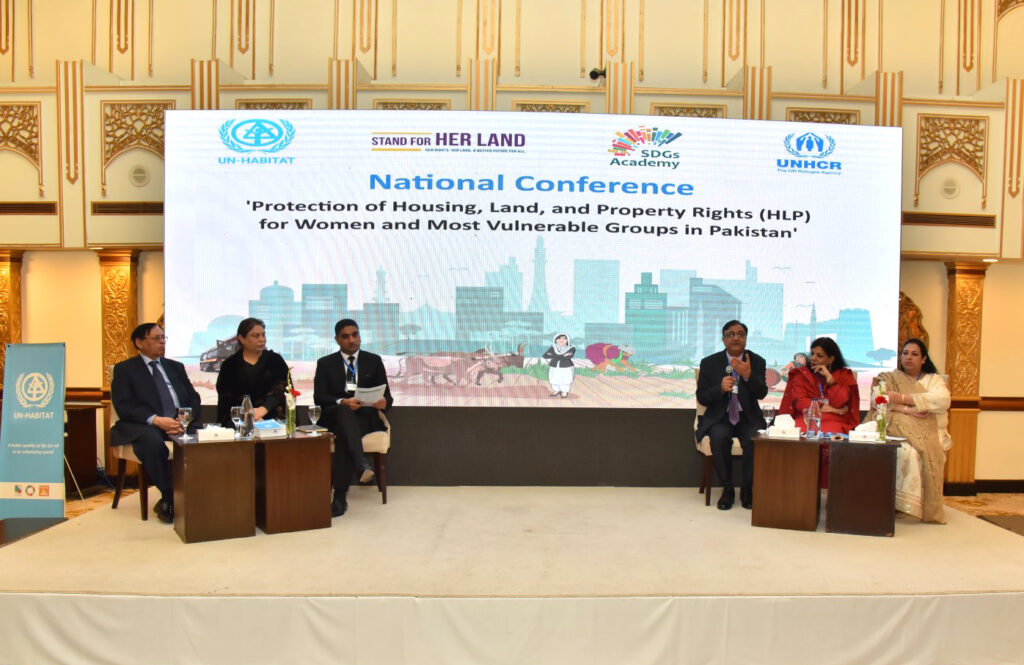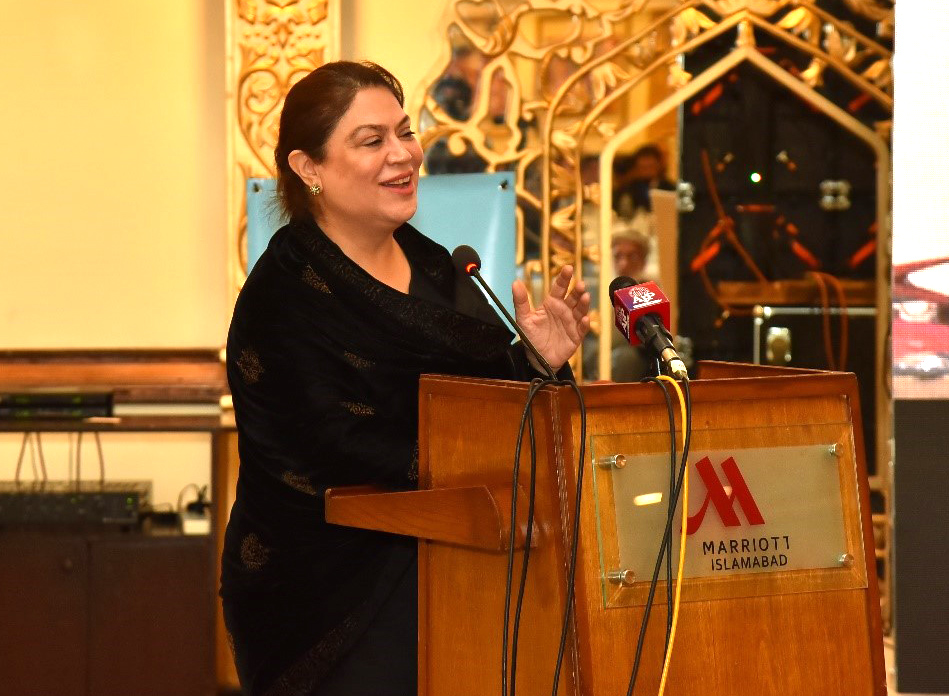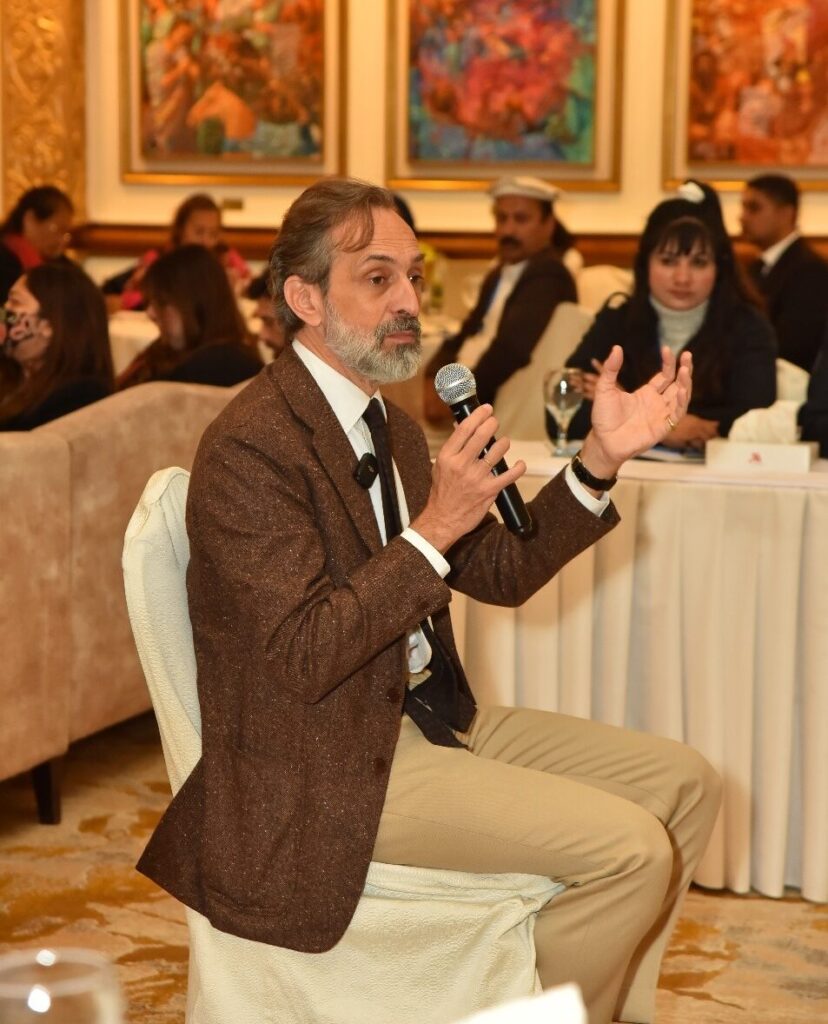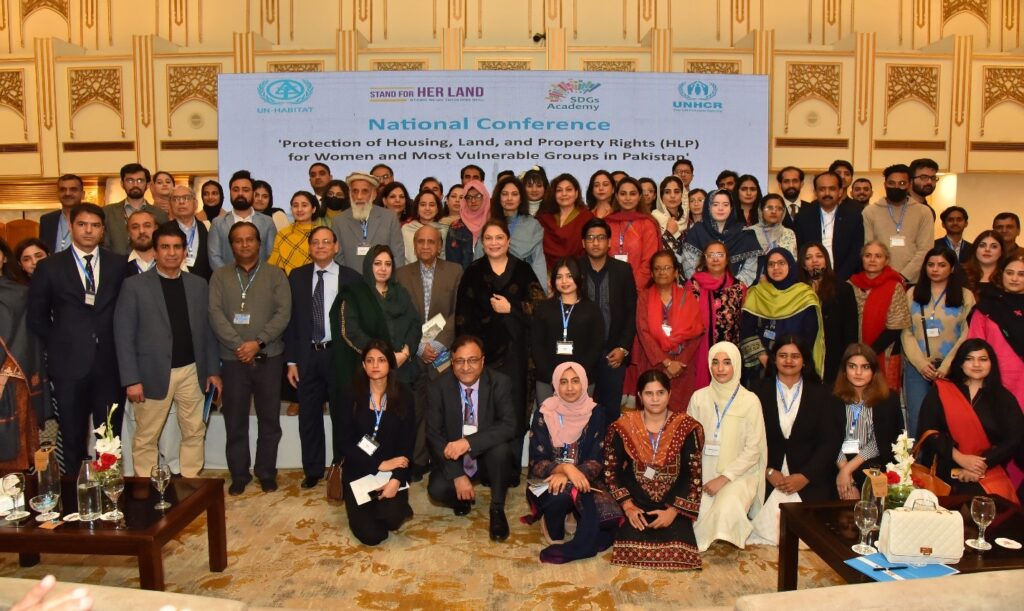Denial of Women’s Housing, Land and Property Rights (HLP) is Gender Based Violence (GBV)
 Islamabad, November 28, 2023- The United Nations Human Settlements Programme (UN-Habitat) marked the culmination of its awareness campaign with a three-day National Conference (November 28-30, 2023) aimed at securing Housing, Land, and Property (HLP) Rights for women and vulnerable groups in Pakistan. The inaugural session was graced by Ms. Nilofar Bakhtiar, Chairperson of the National Commission on the Status of Women, who served as the Chief Guest. Noteworthy attendees included representatives from the Government of Pakistan, the United Nations, foreign dignitaries, international non-governmental organizations (INGOs), and academia.
Islamabad, November 28, 2023- The United Nations Human Settlements Programme (UN-Habitat) marked the culmination of its awareness campaign with a three-day National Conference (November 28-30, 2023) aimed at securing Housing, Land, and Property (HLP) Rights for women and vulnerable groups in Pakistan. The inaugural session was graced by Ms. Nilofar Bakhtiar, Chairperson of the National Commission on the Status of Women, who served as the Chief Guest. Noteworthy attendees included representatives from the Government of Pakistan, the United Nations, foreign dignitaries, international non-governmental organizations (INGOs), and academia.
Mr. Jawed Ali Khan, Habitat Programme Manager at UN-Habitat, warmly welcomed participants and shed light on the conference’s genesis, which emerged as a response to the catastrophic floods in 2022. These floods affected over 33 million people, displacing numerous families and necessitating urgent rehabilitation and house reconstruction. UN-Habitat’s primary objective is to tackle the complex issues surrounding land ownership, property rights, and land tenure security, with a specific focus on women and vulnerable groups.
 Ms. Nilofar Bakhtiar underscored the glaring discrimination against women regarding their housing, land, and property rights, despite the existence of relevant laws and articles. She highlighted the challenges faced by women in Pakistan, particularly those involved in agriculture but lacking land ownership. Ms. Bakhtiar advocated for collaborative efforts and social activism to empower women, stressing the importance of addressing the hurdles faced by women and vulnerable groups in accessing HLP rights. She assured the support of the National Commission on the Status of Women in raising awareness about HLP rights and eliminating barriers to access these rights.
Ms. Nilofar Bakhtiar underscored the glaring discrimination against women regarding their housing, land, and property rights, despite the existence of relevant laws and articles. She highlighted the challenges faced by women in Pakistan, particularly those involved in agriculture but lacking land ownership. Ms. Bakhtiar advocated for collaborative efforts and social activism to empower women, stressing the importance of addressing the hurdles faced by women and vulnerable groups in accessing HLP rights. She assured the support of the National Commission on the Status of Women in raising awareness about HLP rights and eliminating barriers to access these rights.
 Mr. Julien Harneis, Resident Coordinator of the United Nations in Pakistan, expressed gratitude and highlighted how people were compelled to settle along roads in 2022 due to fears of losing land without legal rights, which hindered job mobility and led to malnutrition. He identified two critical issues: the vulnerability of families lacking education and basic necessities and the crucial need to grant land rights, especially to households headed by women. While acknowledging the efforts of the Sindh government in providing land titles, Mr. Harneis urged for an extension of this support to all vulnerable communities. He emphasized the significance of property rights for investment and called for a focus on recent property law rights in Pakistan.
Mr. Julien Harneis, Resident Coordinator of the United Nations in Pakistan, expressed gratitude and highlighted how people were compelled to settle along roads in 2022 due to fears of losing land without legal rights, which hindered job mobility and led to malnutrition. He identified two critical issues: the vulnerability of families lacking education and basic necessities and the crucial need to grant land rights, especially to households headed by women. While acknowledging the efforts of the Sindh government in providing land titles, Mr. Harneis urged for an extension of this support to all vulnerable communities. He emphasized the significance of property rights for investment and called for a focus on recent property law rights in Pakistan.
Ms. Leyla Nugmanova, Assistant Representative at UNHCR, highlighted the organization’s initiative to prevent violence against women. She stressed the pivotal role of HLP laws in challenging patriarchal norms and empowering women, particularly in times of disasters. Housing, Land, and Property rights were emphasized as the cornerstone of the Humanitarian and Development Nexus. Furthermore, Ms. Fareeha Umar, Portfolio Specialist at UN WOMEN, explained how legal barriers, discriminatory implementation of legal frameworks, and deeply entrenched cultural norms restrict women and vulnerable groups’ access to property ownership and inheritance rights.
A panel discussion took place during the inaugural session of the conference, featuring esteemed panelists such as Ms. Nusrat Hashmi, Advocate at Lahore High Court; Dr. Raana Malik, Chairperson of the Department of Gender Studies at the University of Punjab; and Mr. Asim Bhatti, Member and Advocate at the District and High Court Bar Association. They underscored the insufficient awareness among women regarding their Housing, Land, and Property (HLP) rights, emphasizing the critical need to tackle this challenge. The discussion highlighted the necessity for concerted efforts, comprising the implementation of legal reforms, educational initiatives, and community awareness programs. These initiatives are geared towards ensuring fair and accessible Housing, Land, and Property Rights for women and vulnerable groups in Pakistan. Recognizing the importance of empowering stakeholders with a comprehensive understanding of the legal framework and its gender-sensitive application was identified as a crucial step in achieving the goals of providing accessible HLP services.

